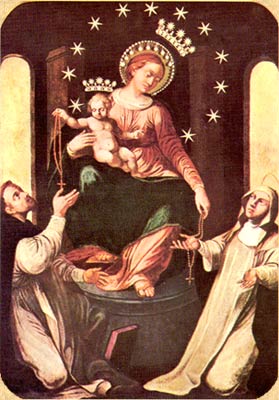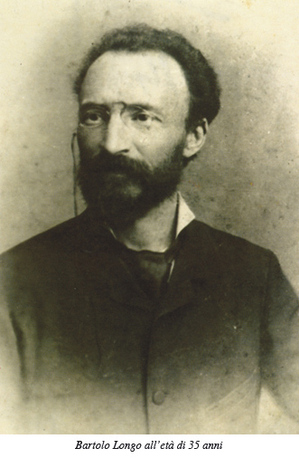The Rosary: School of Contemplation and Silence
 One of Barbara Pym’s characters — I don’t remember which one — sometimes exclaims, “Too much richness!” Exactly my sentiments concerning this past weekend! There was altogether too much going on: the Synod in Rome with the Ecumenical Patriarch’s extraordinary address, the Holy Father’s visit to the Sanctuary of the Madonna del Rosario at Pompei, the beatification of Louis and Zélie Martin at Lisieux, and the feasts of Saint Philip Howard, of the Jesuit Martyrs of North America, of Blessed Agnès de Langeac, and of Saint Paul of the Cross. Finally, I decided to translate the Holy Father’s address at Pompei for the dear readers of Vultus Christi. Here it is:
One of Barbara Pym’s characters — I don’t remember which one — sometimes exclaims, “Too much richness!” Exactly my sentiments concerning this past weekend! There was altogether too much going on: the Synod in Rome with the Ecumenical Patriarch’s extraordinary address, the Holy Father’s visit to the Sanctuary of the Madonna del Rosario at Pompei, the beatification of Louis and Zélie Martin at Lisieux, and the feasts of Saint Philip Howard, of the Jesuit Martyrs of North America, of Blessed Agnès de Langeac, and of Saint Paul of the Cross. Finally, I decided to translate the Holy Father’s address at Pompei for the dear readers of Vultus Christi. Here it is:
A Gift from the Heart of Our Lady
Before entering the Sanctuary to recite the Holy Rosary together with you, I paused briefly before the tomb of Blessed Bartolo Longo and, praying, I asked myself: “Whence did this great apostle of Mary draw the energy and constancy necessary to bring to completion so imposing a work, now known in all the world? Is it not from the Rosary that he received as a true gift from the heart of Our Lady?”
The School of the Virgin
Yes, it was really so! The experience of the saints witnesses to this: this popular Marian prayer is a precious spiritual means to grow in intimacy with Jesus and learn, at the school of the Holy Virgin, to carry out always the Divine Will.
The Rosary is contemplation of the mysteries of Christ in spiritual union with Mary, as the Servant of God Paul VI emphasized in the Apostolic Exhortation Marialis Cultus, and then, as my venerated predecessor John Paul II amply illustrated in the Apostolic Letter Rosarium Virginis Mariae, which, ideally, I give again to the community of Pompei and to each one of you.
Authentic Apostles of the Rosary
You who live and work here at Pompei, especially you, dear priests, religious, and layfolk engaged in this singular portion of the Church, are called — all of you — to make the charism of Blessed Bartolo Longo your own and to become, in the measure and in the ways granted by God to each one, authentic apostles of the Holy Rosary.
Contemplate the Face of Christ
But, in order to be apostles of the Rosary, it is necessary to experience first hand the beauty and depth of this prayer that is simple and accessible to all. It is, above all, necessary to allow oneself to be led by the hand of the Holy Virgin to contemplate the Face of Christ: His joyful, luminous, sorrowful, and glorious Face. One who, like Mary and together with her, assiduously keeps and meditates the mysteries of Jesus, assimilates His sentiments more and more, and is conformed to Him. It pleases me, in this regard, to quote a beautiful consideration of Blessed Bartolo Longo.
 Familiarity with Jesus and Mary
Familiarity with Jesus and Mary
“Just as two friends,” he writes, “going about frequently together, are wont to conform themselves to each other in their manners, so too do we, conversing familiarly with Jesus and the Virgin in the meditation of the Mysteries of the Rosary, and forming together one and the same life by means of communion with them, become like them, whatever be our lowliness, and learn from these consummate examples how to live humbly, in poverty, in hiddenness, patience, and perfection.”
Contemplation and Silence
The Rosary is a school of contemplation and of silence. At a first glance, it may seem like a prayer that accumulates words, one that it is difficult to reconcile with the silence rightly required for meditation and contemplation. In reality, the cadenced repetition of the Ave Maria does not disturb interior silence; on the contrary it calls it forth and sustains it.
Akin to the Divine Office
It is analogous to what happens with the psalms when one prays the Liturgy of the Hours. Silence flowers through the words and the phrases, not as a void, but as a presence of their ultimate meaning, which goes beyond the words themselves and, together with them, speaks to the heart.
Like the Whisper of a Gentle Breeze
Thus, in reciting the Ave Marias, one must pay attention in such wise that our voices do not “cover” the voice of God, which always speaks through silence, like “the whisper of a gentle breeze” (1 K 19:12).
Interior Silence in the Recitation of the Rosary
How important it is, then, to foster this silence full of God, be it in personal or communal recitation [of the Rosary]. Even when it happens that the Rosary is prayed in great assemblies, as we did, and as is done each day in this Sanctuary, it is necessary that the Rosary be perceived as a contemplative prayer, and this cannot happen if a climate of interior silence is lacking.
The Rosary: Response to the Word of God
I should like to add another reflection relative to the Word of God in the Rosary. This is particularly opportune at this period in which the Synod of Bishops on the theme “The Word of God in the Life and Mission of the Church” is taking place in the Vatican. If Christian contemplation cannot prescind from the Word of God, so too must the Rosary, if it is to be a contemplative prayer, emerge always from the silence of the heart as a response to the Word, modeled after the prayer of Mary.
Woven of Sacred Scripture
Considered well, one sees that the Rosary is entirely woven of Sacred Scripture. There is, first of all, the enunciation of the mystery, preferably done with words drawn from the Bible. Then follows the Our Father: by impressing upon our prayer its vertical orientation, it opens the mind of one reciting the Rosary to the correct filial attitude: “When you pray, say Father . . .” (Lk 11:2). The first part of the Hail Mary, also drawn from the Gospel, makes us each time hear anew the words with which God addressed the Virgin through the Angel, and the blessing of her cousin, Elizabeth. The second part of the Hail Mary resounds as the response of children who, in addressing petitions to their Mother, do nothing other than express their own adhesion to the saving plan revealed by God. In this way, the thought of the one praying remains always anchored to Scripture and to the mysteries presented therein.
Charity and Peace
Finally, remembering that today we are celebrating the World Day of Missions, I am pleased to recall the apostolic dimension of the Rosary, a dimension that Blessed Bartolo Longo lived intensely, drawing from it inspiration to undertake here in this place so many works of charity and of human and social promotion. Moreover, he wished that this Sanctuary should be open to the entire world, as a centre of irradiation of the prayer of the Rosary and a place of intercession for peace among peoples. Dear friends, I desire to confirm both of these aims — the apostolate of charity and prayer for peace– and I entrust them to your spiritual and pastoral labours. Following the example, and with the support of your venerated Founder, do not grow weary of working with passion in this part of the vineyard of the Lord for which the Madonna has shown a special love.
Farewell
Dear brothers and sisters, the moment has come for me to take leave of you and of this beautiful Sanctuary. I thank you for the warm welcome and, above all, for your prayers. I thank the Archbishop Prelate and Pontifical Delegate and his collaborators, and those who worked to prepare my visit so well. I must leave you, but my heart remains close to this place and to this community. I entrust you all to the Blessed Virgin of the Holy Rosary, and to each one, from the heart, I impart my Apostolic Blessing.
